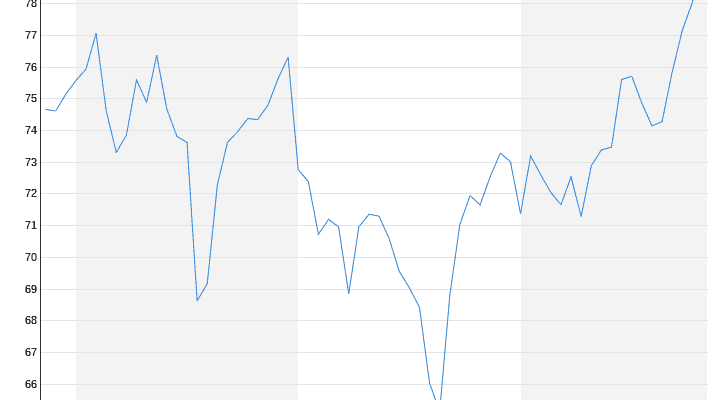Monday, September 27, 2021
Wall Street with losses
Soaring oil prices are driving energy sector
The rally in oil prices is driving Wall Street’s energy stocks strong. Nevertheless, the US stock exchanges close in the red. Tech values in particular are falling behind. In the meantime, the general election does not play a role for the euro.
Led by technology stocks, losses outnumbered Wall Street at the start of the week. On the flip side, stocks in the energy sector made significant gains as oil prices continued to rally. While the uncertainty about the damage that the shaky Chinese real estate company China Evergrande could cause worldwide in the event of a collapse was simmering in the background, the rise in market interest rates continued for the fifth day in a row and slowed the buying mood.
The rise in interest rates weighed particularly heavily on technology stocks, the Nasdaq indices lost up to 0.8 percent, but were much more behind in the early stages. Of the S&P 500 concluded narrowly claiming that Dow Jones Index gained 0.2 percent to 34,869 points, supported by price gains in bank shares and the heavily weighted shares of Chevron (+ 2.4%) and Boeing (+ 1.3%).
Signals from the US Federal Reserve
While bank stocks benefited from rising interest rates because they made the lending business more profitable, Chevron with oil prices at three-year highs were in demand. At the Nyse were counted according to the first information in 1962 (Friday: 1491) course winners and 1373 (1783) losers. 108 (129) titles closed unchanged. Ten-year US bonds recently returned 1.48 percent, after 1.45 percent on Friday. That is the highest level since June. Behind the upward movement are signals from the US Federal Reserve (but also from other central banks), probably in the current year, to tighten the ultra-loose monetary policy course and possibly raise interest rates as early as the end of 2022.
“We see a rotation in stocks from the bond market. When growth stocks do badly, it tends to affect most of the market capitalization of the indices and that depresses them,” said fund manager Shaniel Ramjee of Pictet Asset Management. The technology sub-index in the S&P 500 index lost 0.9 percent, the index of banks gained 2.3 percent. Surprisingly good US durable goods orders were more likely to fuel interest rate concerns than to inspire buyers. They rose faster in August than economists expected, which was mainly due to increased orders from Boeing.
Energy rally
the Oil prices reached their highest level since 2018 after gains of up to 2.0 percent. Brent oil last cost 79.44 US dollars per barrel. Goldman Sachs analysts have raised their 2021 oil price forecast by 10 to 90 US dollars a barrel. They justify this with the aftermath of hurricane “Ida” and the increasing demand for oil. According to market observers, the latter is also related to the rally in natural gas prices. The price for delivery in October shot up by 11 percent, to the highest level since 2014. Concerns about contagion have driven prices, it said with a view to the current shortage of natural gas in Europe. Tyler Richey, associate editor of Sevens Report Research, said the weather is a big part of natural gas. Currently, in anticipation of a severe winter at a historically high rate, stocks are being built up.
Biggest winners on Wall Street were stocks like Southwestern Energy, EQT, Transocean or Murphy Oil with surcharges of up to 22 percent. The energy sector in the S&P 500 led the list of winners with a plus of 3.7 percent. For the cruise operator’s papers Carnival it went up 3.7 percent. The company reported well-received quarterly figures on Friday and is now letting ships put to sea from the port of Los Angeles again – because of the corona pandemic for the first time in around a year. Gores Guggenheim rose by almost 6 percent. The Swedish electric car brand Polestar plans an IPO on the Nasdaq in the course of a merger with the shell company Gores Guggenheim. Quiet on the foreign exchange market Little happened on the foreign exchange market. The result of the German federal election played for the Euro as hardly a role before the election.
